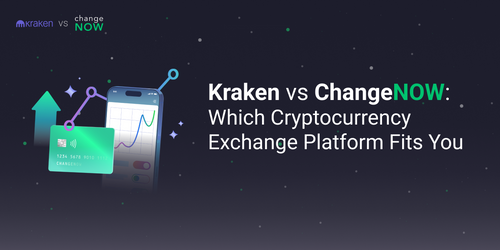Beginner's Guide: How Does Crypto Work?
Start your journey into the realm of cryptocurrencies with this guide! The world of digital currencies like Bitcoin and Ethereum can seem daunting to newcomers. This beginner-friendly guide, brought to you by ChangeNOW, will help you understand the basics of cryptocurrencies and blockchain technology, and guide you through the simple process of crypto exchange. Get ready to explore the intriguing universe of digital currencies!
Defining Cryptocurrency
Cryptocurrencies are digital or virtual currencies that use cryptographic security. They differ from conventional currencies such as the US Dollar or Euro by operating on decentralized blockchain platforms.

The name 'cryptocurrency' derives from the encryption methods used to protect these assets. Being decentralized means they are not governed by any central authority, offering more security and privacy.
Cryptocurrencies are created through 'mining', a process involving complex calculations done by powerful computers. Bitcoin leads as the most recognized cryptocurrency, followed by others like Ethereum, Cardano, and Ripple (XRP).
How Cryptocurrencies Function
Cryptocurrencies run on blockchain technology, consisting of linked blocks each recording a series of transactions. This setup guarantees that once recorded, transactions cannot be altered, ensuring the integrity and transparency of the network.
These digital currencies operate on a peer-to-peer basis, allowing direct transactions without intermediaries. Transactions are verified by network nodes using cryptography and are then added to the blockchain.
The valuation of cryptocurrencies depends on supply and demand dynamics, market sentiments, and technological developments. Note that their prices can be extremely volatile.
Cryptocurrency's Growing Appeal
Several factors contribute to the growing popularity of cryptocurrencies:
Decentralization: They are independent of any government or financial institution control, giving users complete control over their funds.
Security and Anonymity: Cryptocurrencies provide enhanced security and privacy since transactions are secured cryptographically and are pseudonymous.
Investment Potential: The price volatility of cryptocurrencies can result in significant returns, as seen with Bitcoin's value increase over the years.
Ease of Transactions: Cryptocurrencies enable global transactions without the need for a bank account or concern for cross-border fees.
Technological Advancements: Blockchain, the underlying technology, is being explored for applications beyond digital currencies in various sectors.
Exploring Blockchain
Blockchain is a database that records information in blocks linked together. When a block is filled with data, it is linked to the preceding block, thus creating a chain.
Blockchain is crucial to cryptocurrencies, ensuring transaction transparency and security, with each transaction recorded on a public ledger and unalterable.
Blockchain vs. Cryptocurrency: Understanding the Difference
Blockchain is the underlying technology enabling cryptocurrencies, while cryptocurrency is a digital medium of exchange that exists on the blockchain.
Influential Figures in Cryptocurrency
The cryptocurrency industry has been shaped by figures like Satoshi Nakamoto, who initiated the sector with Bitcoin, Vitalik Buterin, the mind behind Ethereum, and Changpeng Zhao, founder of the Binance exchange.
Buying and Exchanging Cryptocurrencies
Thanks to platforms like ChangeNOW, purchasing and exchanging cryptocurrencies is straightforward. Users can buy cryptocurrencies with traditional currencies or exchange them for other digital currencies without needing an account.
Crypto and Taxes
In many regions, cryptocurrencies are taxed as property, meaning capital gains taxes apply to their sale, trade, or use in purchases.
Is Cryptocurrency a Good Investment?
Cryptocurrencies can yield high returns but are also marked by significant risks like price volatility and regulatory uncertainties. They are speculative investments, suitable for risk-tolerant investors.
Cryptocurrency Mining Demystified
Mining in the cryptocurrency context involves using computer hardware to solve complex problems, verifying and adding transactions to the blockchain, with miners receiving cryptocurrency rewards.
What is Staking in Cryptocurrency?
Staking in cryptocurrency means holding coins in a digital wallet to support network functions, with rewards offered to participants.
Cryptocurrency Market Capitalization
Market capitalization in cryptocurrency is the total value of all circulating coins of a specific currency, calculated by multiplying its current price with the circulating supply.
The Future of Cryptocurrency
The future of cryptocurrencies is filled with possibilities, potentially reshaping our transactional and investment practices.
Conclusion
Cryptocurrencies represent a significant technological advancement with the potential to transform financial systems. For beginners or seasoned traders, ChangeNOW offers a seamless platform for buying, selling, and exchanging cryptocurrencies. Begin your cryptocurrency adventure with ChangeNOW!




